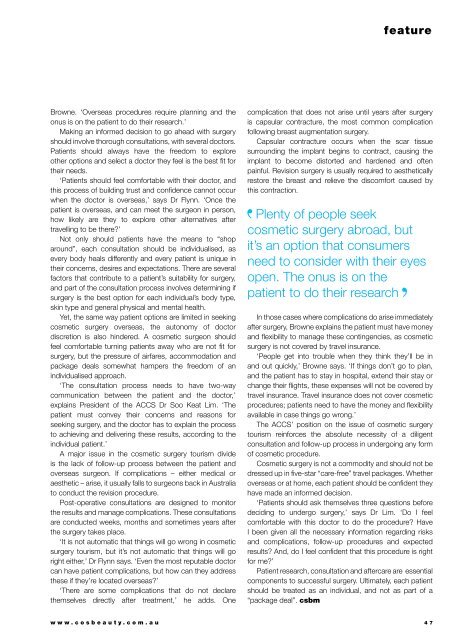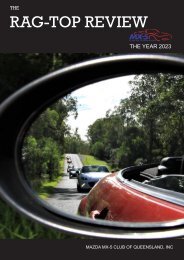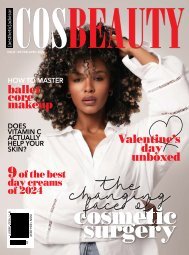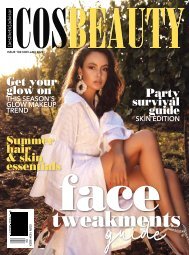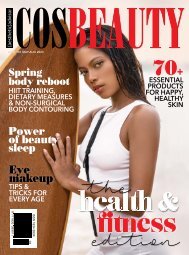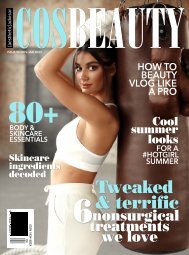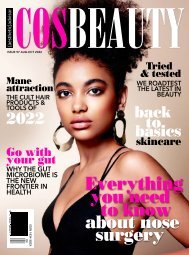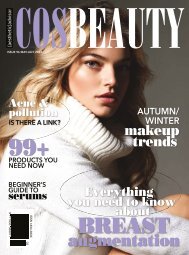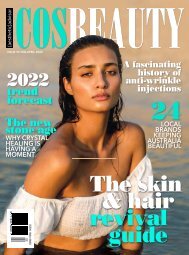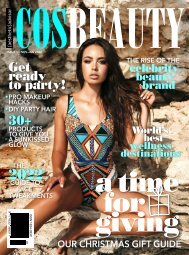Cosmetic Surgery and Beauty Magazine #64
Cosmetic Surgery & Beauty Magazine is the definitive guide to the aesthetic medicine industry for anyone considering a treatment therapy or surgical procedure. This quality quarterly publication contains comprehensive information about practitioners, equipment, techniques, processes and options, presented clearly and completely. The strong emphasis on input by industry professionals provides profiles of the practitioners and understanding of their approach to each procedure, enabling readers to make informed choices in their initial approaches to deciding what will best suit their needs. Hundreds of untouched before-and-after photographs provided by the practitioners themselves graphically illustrate both treatable conditions and the results that can be obtained. Cosmetic Surgery & Beauty Magazine is essential reading for anyone wishing to inform themselves about the options available in aesthetic medicine in Australia.
Cosmetic Surgery & Beauty Magazine is the definitive guide to the aesthetic medicine industry for anyone considering a treatment therapy or surgical procedure. This quality quarterly publication contains comprehensive information about practitioners, equipment, techniques, processes and options, presented clearly and completely. The strong emphasis on input by industry professionals provides profiles of the practitioners and understanding of their approach to each procedure, enabling readers to make informed choices in their initial approaches to deciding what will best suit their needs. Hundreds of untouched before-and-after photographs provided by the practitioners themselves graphically illustrate both treatable conditions and the results that can be obtained. Cosmetic Surgery & Beauty Magazine is essential reading for anyone wishing to inform themselves about the options available in aesthetic medicine in Australia.
You also want an ePaper? Increase the reach of your titles
YUMPU automatically turns print PDFs into web optimized ePapers that Google loves.
feature<br />
Browne. ‘Overseas procedures require planning <strong>and</strong> the<br />
onus is on the patient to do their research.’<br />
Making an informed decision to go ahead with surgery<br />
should involve thorough consultations, with several doctors.<br />
Patients should always have the freedom to explore<br />
other options <strong>and</strong> select a doctor they feel is the best fit for<br />
their needs.<br />
‘Patients should feel comfortable with their doctor, <strong>and</strong><br />
this process of building trust <strong>and</strong> confidence cannot occur<br />
when the doctor is overseas,’ says Dr Flynn. ‘Once the<br />
patient is overseas, <strong>and</strong> can meet the surgeon in person,<br />
how likely are they to explore other alternatives after<br />
travelling to be there?’<br />
Not only should patients have the means to “shop<br />
around”, each consultation should be individualised, as<br />
every body heals differently <strong>and</strong> every patient is unique in<br />
their concerns, desires <strong>and</strong> expectations. There are several<br />
factors that contribute to a patient’s suitability for surgery,<br />
<strong>and</strong> part of the consultation process involves determining if<br />
surgery is the best option for each individual’s body type,<br />
skin type <strong>and</strong> general physical <strong>and</strong> mental health.<br />
Yet, the same way patient options are limited in seeking<br />
cosmetic surgery overseas, the autonomy of doctor<br />
discretion is also hindered. A cosmetic surgeon should<br />
feel comfortable turning patients away who are not fit for<br />
surgery, but the pressure of airfares, accommodation <strong>and</strong><br />
package deals somewhat hampers the freedom of an<br />
individualised approach.<br />
‘The consultation process needs to have two-way<br />
communication between the patient <strong>and</strong> the doctor,’<br />
explains President of the ACCS Dr Soo Keat Lim. ‘The<br />
patient must convey their concerns <strong>and</strong> reasons for<br />
seeking surgery, <strong>and</strong> the doctor has to explain the process<br />
to achieving <strong>and</strong> delivering these results, according to the<br />
individual patient.’<br />
A major issue in the cosmetic surgery tourism divide<br />
is the lack of follow-up process between the patient <strong>and</strong><br />
overseas surgeon. If complications – either medical or<br />
aesthetic – arise, it usually falls to surgeons back in Australia<br />
to conduct the revision procedure.<br />
Post-operative consultations are designed to monitor<br />
the results <strong>and</strong> manage complications. These consultations<br />
are conducted weeks, months <strong>and</strong> sometimes years after<br />
the surgery takes place.<br />
‘It is not automatic that things will go wrong in cosmetic<br />
surgery tourism, but it’s not automatic that things will go<br />
right either,’ Dr Flynn says. ‘Even the most reputable doctor<br />
can have patient complications, but how can they address<br />
these if they’re located overseas?’<br />
‘There are some complications that do not declare<br />
themselves directly after treatment,’ he adds. One<br />
complication that does not arise until years after surgery<br />
is capsular contracture, the most common complication<br />
following breast augmentation surgery.<br />
Capsular contracture occurs when the scar tissue<br />
surrounding the implant begins to contract, causing the<br />
implant to become distorted <strong>and</strong> hardened <strong>and</strong> often<br />
painful. Revision surgery is usually required to aesthetically<br />
restore the breast <strong>and</strong> relieve the discomfort caused by<br />
this contraction.<br />
Plenty of people seek<br />
cosmetic surgery abroad, but<br />
it’s an option that consumers<br />
need to consider with their eyes<br />
open. The onus is on the<br />
patient to do their research<br />
In those cases where complications do arise immediately<br />
after surgery, Browne explains the patient must have money<br />
<strong>and</strong> flexibility to manage these contingencies, as cosmetic<br />
surgery is not covered by travel insurance.<br />
‘People get into trouble when they think they’ll be in<br />
<strong>and</strong> out quickly,’ Browne says. ‘If things don’t go to plan,<br />
<strong>and</strong> the patient has to stay in hospital, extend their stay or<br />
change their flights, these expenses will not be covered by<br />
travel insurance. Travel insurance does not cover cosmetic<br />
procedures; patients need to have the money <strong>and</strong> flexibility<br />
available in case things go wrong.’<br />
The ACCS’ position on the issue of cosmetic surgery<br />
tourism reinforces the absolute necessity of a diligent<br />
consultation <strong>and</strong> follow-up process in undergoing any form<br />
of cosmetic procedure.<br />
<strong>Cosmetic</strong> surgery is not a commodity <strong>and</strong> should not be<br />
dressed up in five-star “care-free” travel packages. Whether<br />
overseas or at home, each patient should be confident they<br />
have made an informed decision.<br />
‘Patients should ask themselves three questions before<br />
deciding to undergo surgery,’ says Dr Lim. ‘Do I feel<br />
comfortable with this doctor to do the procedure? Have<br />
I been given all the necessary information regarding risks<br />
<strong>and</strong> complications, follow-up procedures <strong>and</strong> expected<br />
results? And, do I feel confident that this procedure is right<br />
for me?’<br />
Patient research, consultation <strong>and</strong> aftercare are essential<br />
components to successful surgery. Ultimately, each patient<br />
should be treated as an individual, <strong>and</strong> not as part of a<br />
“package deal”. csbm<br />
www.cosbeauty.com.au 47


